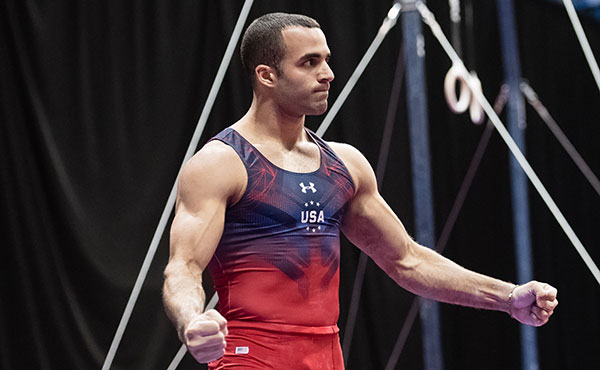
By Jo-Ann Barnas, Special contributor
RIO – His lower left calf reveals the lingering red scars from a pair of dog bites. They signify the pain Danell Leyva endured earlier this season, back when the injury prevented him from performing at his best when he needed to most.
But that’s in the past.
You know this because Leyva is standing before you with a look of contentment on his face. It’s the peace of mind associated with working through hardship and heartache, then rising above it, to arrive at his second Olympics after being called upon last month to replace injured teammate John Orozco.
Asked how he’d describe these past couple of months, Leyva doesn’t hesitate to answer.
“Interesting,” he said. “That’s the best way to put it.”
Leyva, 24, is the U.S. Olympic team’s most-decorated male gymnast at the Rio Games, and the only one to win a medal – a bronze – in the individual all-around at the London Olympics. He has also won three World championship Medals in the last two years – a team bronze and parallel bars silver in 2014, and horizontal bar silver in 2015. His resume also includes winning the 2011 World parallel bars title.
But a dismal performance at the P&G Championships in early June – the first of two Olympic qualification events – called into question his Olympic preparedness. He finished 16th in the all-around there, perhaps feeling the after-effects of being bit by his family’s bulldogs while trying to break up a dog fight a couple of weeks before.
By the time he reached the Olympic trials in St. Louis, he looked stronger the second day than the first, and finished third over the two nights of competition. He was happy with his performance, completing all six events on both days without a major mistake. But the Olympics selection committee was looking at combined results from both P&G’s and trials, which left him in 10th place.
After not being named to the five-member squad – Sam Mikulak, Chris Brooks Jake Dalton, Alex Naddour and Orozco had won the spots – he was selected as an alternate along with Akash Modi and Donnell Whittenburg.
“I didn’t know that they were going to look strictly at numbers, but that’s not any excuse,” he said. “It wasn’t necessarily that disappointing, but (it was) unexpected because I felt like I did a good job at trials, and I was happy with my performance. It was an incredible honor to be picked as an alternate, like, amazing. From that moment, I was training like I was going to compete because you never know what happens in gymnastics and unfortunately. . .”
And unfortunately, the unfortunate happened: Two weeks later, Orozco injured his left knee on a horizontal bar dismount during the men’s Olympic team training camp in mid-July. The result was devastating. Orozco had torn his ACL and meniscus, the same injury to his knee that happened in October 2012.
When Leyva visited Orozco that night, Leyva said his friend was “immediately supportive” in part because he knew how well Leyva had been training. Orozco told him to be ready.
“He kind of knew that it was going to happen – that I was going to be picked onto the team,” Leyva said. “My thought process was to outperform everybody, to try to show the selection committee that I was better, that I was good enough and ready enough to be considered. Unfortunately, it happened the way it did.”
Leyva’s stepfather and coach, Yin Alvarez, in describing the mountain Danell had to climb just to return to his top level of gymnastics, said: “When I saw him being alternate on the team, for us, it was, we made it.”
Mikulak, who’s rooming with Leyva in the Olympic Village, said that while he and his teammates were saddened by Orozco’s injury, they’re super confident about Leyva.
“It’s such a tight knit group in the men’s gymnastics world, that having him replace Orozco, it didn’t feel like a big drastic change because we’re all so comfortable with each other,” Mikulak said. “As big of a disappointment as it is to have John go down, we’re lucky to have the depth to put a guy like Leyva in – a World medalist who has been with us for so many years. We’ve grown up together. It’s nice to have that trust and that friendship to go out and compete in these stressful situations.”
With the men’s event beginning Saturday with team qualification, Leyva said that task is priority No. 1 for Team USA – to try to make Monday’s team final and improve upon their fifth-place finish in London. Although, he knows there’s little chance for him to be considered for the individual all-around – meaning, no opportunity to be a repeat all-around Olympic medalist – he has sights set on something else.
“Obviously, I would love to do (the) all-around, but I still have p-bars and high bar as a chance to medal,” Leyva said.
Leyva said it still “still feels unreal” being in Rio.
“And knowing that it’s my second Olympics, it’s even crazier to think about,” he said. “I’m super excited, honestly, I’m so happy. The team looks good.”
And Leyva is right where he wants to be – in control.
“I usually try not to use gymnastics analogies outside of gymnastics, but in this case it’s pretty solid,” he said. “When you’re competing in the all-around competition, and you mess up on one event, you have to immediately forget about that event so you can focus on the next event. And I go about life thinking the same way.
“What happened in this situation, I have to not forget about it, but maybe even use it for the next event. I can’t let it overwhelm me. I can’t let it get to me too much. I have to keep it when I need it, and keep it there.”




